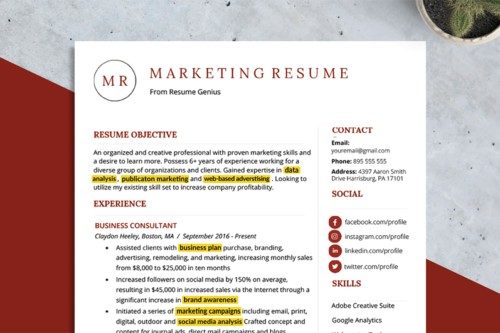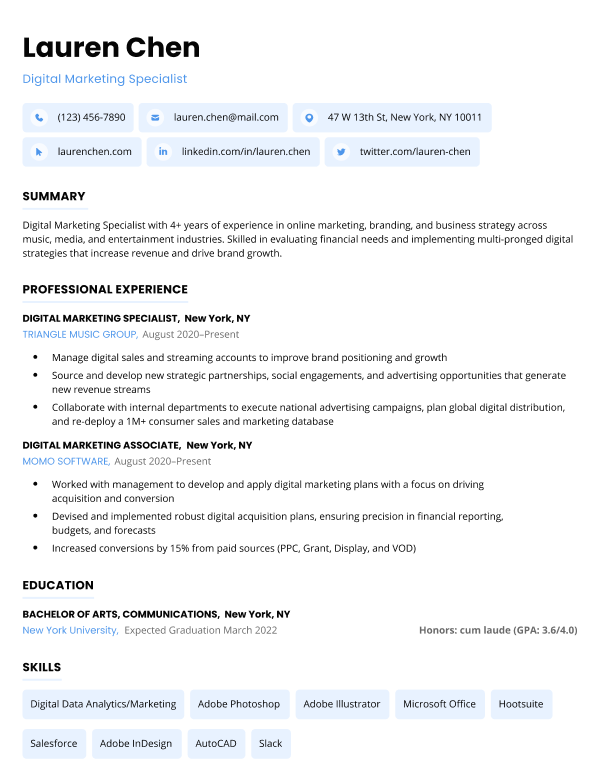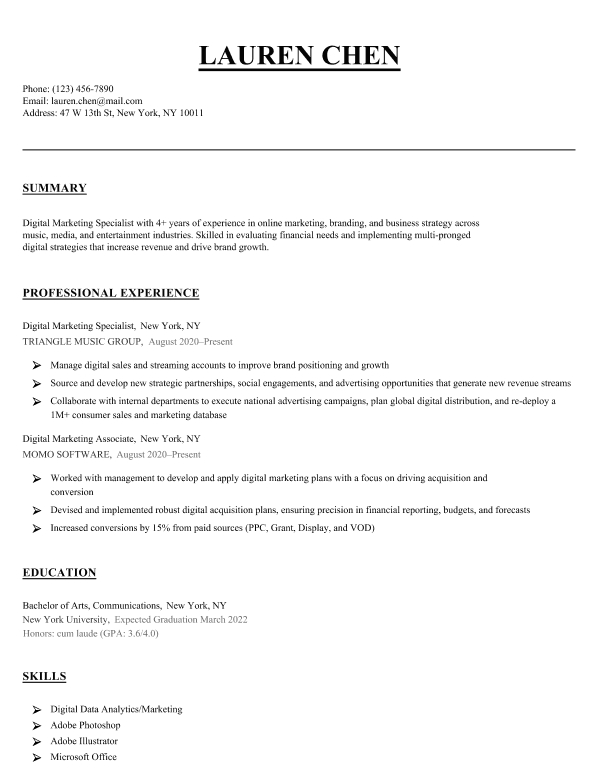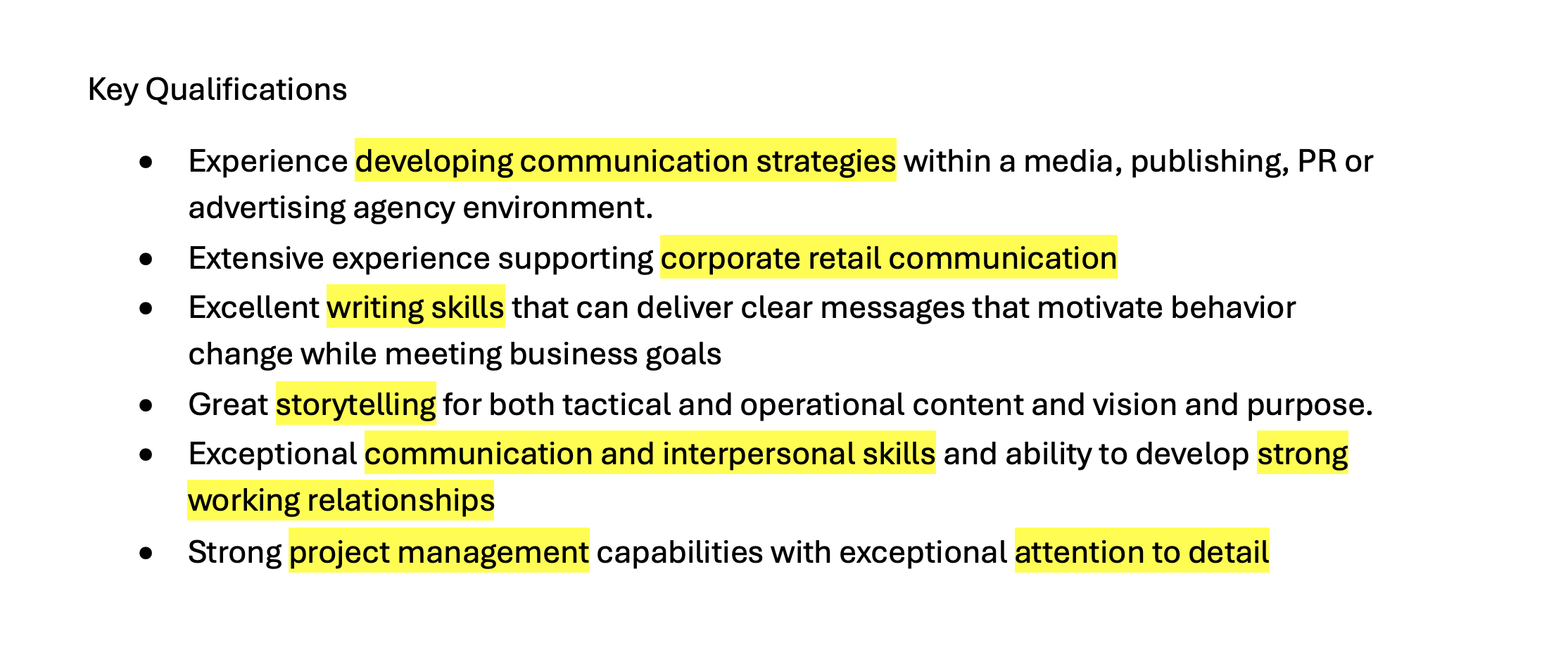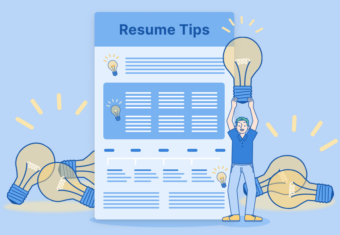Adding keywords to your resume is one of the most important steps to creating a strong job application because it shows hiring managers that you have the abilities and qualifications needed to succeed in the role.
Not only that, but using keywords helps improve the chances that your resume will make it through the applicant tracking system (ATS) software that many large companies use to automatically filter candidates.
Keep reading to learn what resume keywords are and how to use them to strengthen your application.
Our free-to-use resume builder can make you a resume in as little as 5 minutes. Just pick the template you want, and our software will format everything for you.
What are resume keywords?
Resume keywords are specific words or phrases that are used to describe the skills, abilities, and experiences you have that are relevant to the job you’re interested in. They also include industry-specific terms commonly used in the field you’re applying for.
Including these keywords in your resume can help you get selected for interviews because they help recruiters and hiring managers better understand what you have to offer.
Where to find keywords to use in a resume
The best place to find resume keywords is in the job posting for the role.
When you’re scanning a job ad, pay attention to the kinds of words and phrases listed in the “desired qualifications” and “responsibilities” sections.
Here’s a job description for a communications writer position at Apple with resume keywords highlighted in yellow:
After you’ve located all relevant keywords, include the ones that match your experience in your resume and cover letter.
Your Certified Professional Resume Writer Eva Chan explains where to find resume keywords and how to use them when you write a resume at 0:46 in the video below:
By using the keywords listed in the job ad, you maximize your resume’s chances of getting through the application tracking system (ATS) — software used by companies to filter out unqualified applicants.
ATS software scans your resume and cover letter by looking for keywords the hiring manager has programmed into it. If it doesn’t find any of these keywords, the ATS automatically rejects your application.
Almost 75% of companies use or plan to use an ATS, so it’s vital you check the job posting and use the same keywords throughout your resume and cover letter. Otherwise you might miss out on an interview despite being qualified for the role.
Besides strategically using keywords, there are other methods to create an ATS-friendly resume, such as using standard resume fonts.
How to use keywords in your resume
ATS software isn’t always accurate. So when you’ve found the keywords to put on your resume, follow these steps to ensure the software can read them:
1. Stick to plain text
For an ATS, images are hard to read. While it might be tempting to spice up your graphic design resume by embedding keywords for your resume in images, doing so will mean the ATS can’t read them. Use a resume parser to double-check that your information will be presented properly to employers after your resume is put through an ATS.
Make sure you use a straightforward resume format to list your experience.
2. Include a mix of skills, qualifications, and industry-specific words
Keywords related to soft skills and hard skills are ideal to add to your resume
Other keywords to include are any certifications you have — as long as they’re specified in the job listing.
For instance, if the job ad for a web developer role mentions “programming languages,” your skills section might look like this:
- C++
- Java
- Python
- TypeScript
These languages are good examples of industry-specific terminology. Only people specializing in IT are likely to know what “TypeScript” is.
It’s important to use job-specific resume keywords so that the hiring manager knows you’re familiar with the industry — even if you’re looking for an entry-level job.
Including these words shows you’ve done your research and have an interest in the field.
Also, use synonyms to increase the variety of keywords on your resume. A “programmer” should also refer to themself as a “coder” because these two words mean roughly the same thing, and you never know exactly what terms have been programmed into the ATS.
3. Scatter keywords throughout your resume and cover letter
Add resume keywords naturally throughout your application documents to show employers that you’re qualified for the job.
For instance, if you’re writing a teacher resume, you might use the keyword “classroom management” in the skills section.
You can also repeat it in your work experience section to illustrate how you applied this ability in a previous role:

Adding context to the resume keywords you use helps convince hiring managers you’ve mastered the skills you claim to possess. It’s much more effective than listing one ability after the other without proving that you know how to apply them in the workplace.
Using resume buzzwords in your resume and cover letter is another tactic that can give your application an advantage over similarly qualified applicants.
4. Match resume keywords exactly
If the job description mentions that the company’s ideal candidate possesses excellent “logical thinking” skills, you should match this keyword exactly. ATS are instructed to recognize specific words, so it won’t count similar terms like “logical reasoning” unless the employer has programmed it to do so.
The same goes for misspelled words. Always double check your spelling, and enlist a friend to help you proofread your resume and cover letter before you submit them.
Make sure you also include appropriate keywords in your cover letter to help you boost your application.
Resume keyword practices to avoid
While using resume keywords throughout your application boosts your chances of a hiring manager seeing it, more isn’t always better. If you’re not careful about how you include keywords on your resume, recruiters might think you’re either a bad writer or that you’re trying to beat the ATS.
Here are the main resume keyword practices to avoid:
1. Keyword stuffing
Keyword stuffing refers to using the same keyword again and again in an unnatural way to get your resume past the ATS.
People engage in keyword stuffing because some ATS software gives applications a higher ranking when it detects a keyword is used more. For instance, an ATS might assign a higher score to a candidate who mentions “search engine optimization” six times over one who mentions it three times.
Here’s an example of how one applicant tried to stuff the keyword “customer satisfaction” in their resume:

This technique might get your resume past the ATS, but the hiring manager will know what you’re doing and could reject your application because of it.
2. Hidden keywords
This is a sneakier trick some applicants use. It involves copy-pasting a keyword several times but applying a white font so that the keywords are invisible.
Because the ATS scans all words despite their color, it counts all instances of a keyword. For example, a resume might contain five invisible instances of the keyword “digital marketing” but only three visible ones. The “Find” tool can reveal where invisible keywords are:
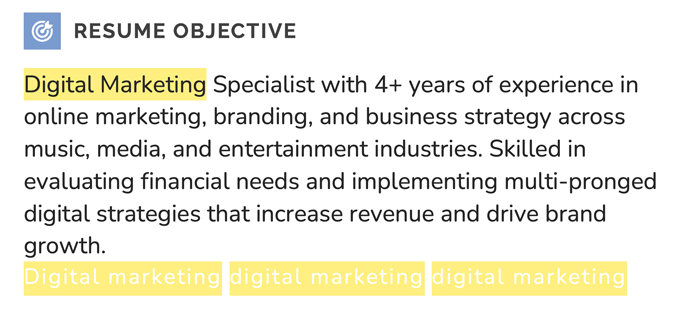
The ATS counts all eight instances though, and ranks that resume higher.
However, most ATS software lets the hiring manager see a plain text version of the resume, meaning that hidden keywords become visible. This makes using hidden keywords a risky tactic that can negatively impact your ability to land a job.
3. Dishonest keywords
Lying on your resume by adding keywords that don’t accurately reflect your skills and experience is a common resume mistake to avoid.
If you’re applying for a senior position and your resume indicates that you’re an expert in the field yet you only have a couple of years of experience, hiring managers are going to become suspicious. Even if you make it through to the interview, expect to be pressed with some tough questions about your skills.
Stick to the abilities and qualifications you actually have. Adding skills on your resume that you lack won’t benefit you in the long run, because employers will eventually find out that you lied on your application when you’re unable to perform your job duties.
Best keywords for your resume (listed by industry)
Below is a list of 170 common industry-specific keywords to put on a resume and cover letter:
- Accounting and Finance
- Administration and Office Support
- Business and Management
- Construction and Maintenance
- Creative and Culture
- Customer Service and Retail
- Education and Human Services
- Emergency Services
- Engineering
- Food Service
- Healthcare and Wellbeing
- Information Technology (IT)
- Law and Legal
- Marketing and Sales
- Personal and Child Care
- Spa and Salon
- Transportation and Logistics
Accounting and Finance
- Account management
- Business volume
- Client accounts
- Budgeting
- Financial reports
- Risk analysis
- Quantitative analysis
- Qualitative analysis
- Auditing
- Forensic accounting
Administration and Office Support
- Data entry
- Microsoft Office
- Office supply inventorying
- Typing
- Schedule management
- Filing
- Call screening
- UKG
- HR (human resources) policy
- Google Calendar
Business and Management
- Business analysis
- Structured Query Language (SQL)
- Client outreach
- Budget management
- Negotiation
- Market insights
- Public relations
- Strategic oversight
- Capital raising
- Six Sigma
Construction and Maintenance
- Power tools
- Carpentry
- Masonry
- Occupational Safety and Health Administration (OSHA)-certified
- Customer service
- National Electrical Codes (NEC)
- Troubleshooting and diagnostics
- Hand tools
- Cleaning
- Machine operation
Creative and Cultural
- Accents
- Singing
- Sculpture
- Adobe Photoshop
- Item cataloging
- Record-keeping
- Handling pressure
- Dean Evans EMS
- Graphic design
- InDesign
Customer Service and Retail
- Complaint resolution
- Point of sale (POS) operation
- Customer satisfaction
- Business administration
- Data entry
- Evacuation procedures
- Technical support
- Diplomacy
- Cardiopulmonary resuscitation (CPR)
- Product displays
Education and Human Services
- Lesson planning
- SMART boards
- Online Public Access Catalog (OPAC)
- Dewey Decimal
- Archiving
- Classroom management
- Differentiated education
- Child development
- Certificate in Teaching English to Speakers of Other Languages (CELTA)
- Curriculum planning
Emergency Services
- Cardiopulmonary Resuscitation/Automatic External Defibrillator (CPR/AED)
- First aid
- Emergency response
- Fire safety
- Equipment maintenance
- Gang outreach
- Self-defense
- Community policing
- De-escalation
- Surveillance
Engineering
- Altair S-Frame
- Trigonometry
- Hazard assessment
- Occupational Safety and Health Administration (OSHA)-certified
- Bid preparation
- Visual Studio
- Electrical systems
- MATLAB
- Prototyping methodologies
- Technical drawings
Food Service
- Cocktail preparation
- Latin American cuisine
- Point of Sales (POS) terminals
- Salesmanship
- Menu presentation
- Kitchen hygiene
- Reservation management
- Food handling and safety
- Equipment cleaning
- Upselling
Healthcare and Wellbeing
- Health Insurance Portability and Accountability Act (HIPAA)
- Patient care
- Hoyer lifts
- X-rays
- Periodontal treatment
- Taking vital signs
- International Classification of Diseases, Tenth Revision (ICD-10) designations
- Physical examinations
- Emergency treatment
- Body combat
Information Technology (IT)
- Visual Basic
- WordPress
- Agile project management
- Scrum
- Market analysis
- Data mining
- Data protection
- OmniGraffle
- iOS
- Back-end programming
Law and Legal
- Contract drafting
- Public defender
- Tort law
- Litigation software
- Typing
- Interview techniques
- Intellectual property
- Filing
- Negotiation
- LexisNexis
Marketing and Sales
- Search engine optimization (SEO)
- Google Analytics
- Screaming Frog
- Marketing strategy
- Web-based advertising
- Accuranker
- Social media
- Campaigning
- Financial forecasting
- Business development
Personal and Child Care
- Potty training
- Conflict resolution
- Games
- Safety awareness
- Applying dressings
- Housekeeping
- Driver’s license
- Story reading
- Meal preparation
- Handling pressure
Spa and Salon
- Massage
- Laser procedures
- Hair dye
- Facials
- Skin care
- Balayage
- Color effects
- Theatrical makeup
- Customer service
- Cleaning
Transportation and Logistics
- Vehicle maintenance
- Route planning
- Commercial driver’s license (CDL)
- Forklifts
- Punctual
- Vehicle inspections
- Account retention
- Interpersonal skills
- Dump trucks
- Teamwork
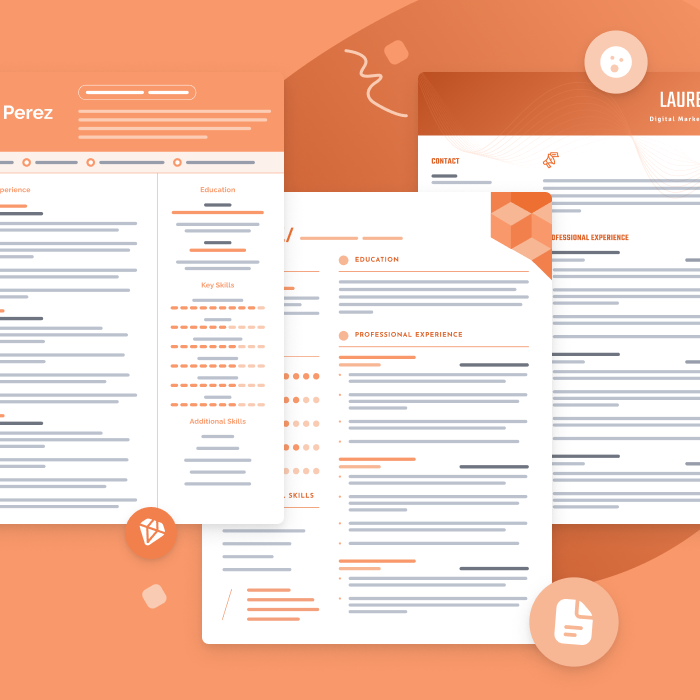
The best resume templates for 2024
One of the best ways to make your resume is by filling out one of our free resume templates. All our templates are designed by experts and free to download for Microsoft Word or Google Docs.
Click to rate this article
4.4 Average rating


